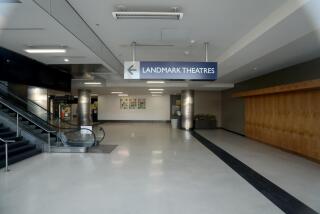Live From the Astrodome, a Radio Station for Evacuees
- Share via
WASHINGTON — Federal regulators have authorized an unusual radio station to serve the estimated 10,000 evacuees living in the Houston Astrodome, part of an effort to fill the information void left by Hurricane Katrina’s disruption of communications services along the Gulf Coast.
The Federal Communications Commission over the weekend granted Houston relief volunteers and media organizers permission to build a 30-watt radio station inside the Astrodome.
Government and industry officials said it was the first time they could recall that a domestic radio station had been set up primarily to keep victims of a U.S. disaster informed.
They predicted that the station would improve communications for residents, who rely mostly on bulletin board postings and word of mouth for news about jobs, missing relatives, housing and child care.
“Families are putting up notices on the walls to find lost parents and children and then crying themselves to sleep at night as they start to let the weight of the past week bear down on them,” said Hannah Sassaman, program director at Philadelphia-based Prometheus, a community radio group helping the Houston effort. “This station will provide critical information for people putting their lives back together.”
The station is the brainchild of James Ellinger, who heads Austin Airwaves Inc., a nonprofit community radio group in Austin, Texas. At 95.3-FM, it will air news about hurricane recovery efforts in the Gulf Coast, as well as information about jobs and enrolling children in schools. The signal is expected to travel three to five miles from the Astrodome.
Reached by phone Wednesday, Ellinger said he was too busy trying to set up the station to comment. But others involved said the station would be a welcome presence in the onetime baseball stadium that has become a giant living room for thousands of evacuees from New Orleans.
“The statement that we’ve heard the most while walking around the floor [of the Astrodome] is that people here most want to hear news about what’s going on back home,” said Trish Stringer, a Rice University professor who is helping to organize the radio station.
The station was scheduled to go on the air today. But Astrodome officials pressured station organizers Wednesday to hold off until they could secure enough portable radios with earphones so that people could listen to the station without disturbing others who might be resting.
Station organizers were in negotiations late Wednesday with officials of Sony Corp. to donate the needed radios, which would be inexpensive and not likely to be stolen.
The push for a radio station in the Astrodome underscores how primitive communications have become in the region after the widespread destruction of Hurricane Katrina.
On Wednesday, Kenneth P. Moran, an FCC official who directs the agency’s domestic security efforts, told members of the House Energy and Commerce Committee that Katrina knocked out more than 3 million phone lines in Louisiana, Mississippi and Alabama and silenced an estimated 50 to 100 radio and television stations.
“Survivors lack information about relief efforts,” Moran said. “People displaced from their homes do not have the means to contact their loved ones to let them know they are safe.”
Houston was the nerve center for much of the early processing of survivors. Evacuees often arrived with just the clothes on their backs after making the 350-mile journey from hard-hit Louisiana.
When they settled in at the Astrodome, they found only a handful of TVs in the concourse area to keep up with the news. But officials said it was not practical to communicate more directly with Astrodome residents using such alternative methods as the stadium public address system because it would disturb people who were resting or sleeping.
Efforts also are underway to improve communications for those involved in the public safety and rescue effort.
The National Assn. of Broadcasters is leading an effort to distribute 1,300 battery-operated, hand-held television sets to those assisting with relief efforts.
The 5-inch television sets, purchased by the association from St. Louis-based GPX, will be distributed to state police officials and other public safety organizations in Louisiana and Mississippi, the group said.
More to Read
Sign up for Essential California
The most important California stories and recommendations in your inbox every morning.
You may occasionally receive promotional content from the Los Angeles Times.










